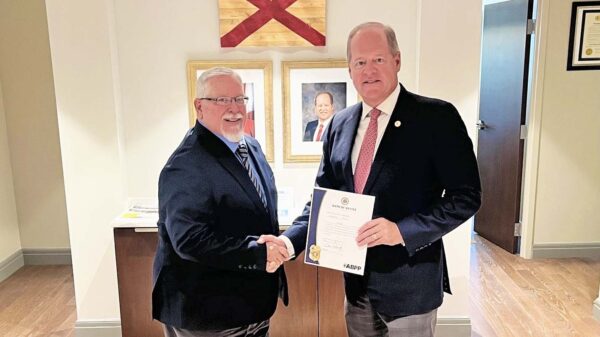Rep. Chris England, D-Tuscaloosa, will try again to bring additional oversight to the Board of Pardons and Paroles in the upcoming session.
England has pre-filed a bill he first brought last session but ultimately withdrew after receiving opposition from Attorney General Steve Marshall.
England said at the time that Marshall had circulated “misinformation” about the bill and and decided to withdraw it and continue working on it outside of floor action.
Marshall said then that the bill would “undermine the board’s independence.”
The bill would create the Criminal Justice Policy Development Council to oversee needs and and parole guidelines. It will also require those guidelines to be used when it makes parole decisions and must state its reasoning if going against the release guidelines.
Every month, the Bureau of Pardons and Paroles is required to report how its actual rate of granting pardons and paroles stacks up against its own guidelines.
According to the latest statistical report published in December, the board is falling drastically short. In October through December, the recommended grant rate based on the board’s own guidelines hovered between 81 and 84 percent. The actual grant rate only reached between 8 and 11 percent.
The percentage of paroles granted has bottomed out after declining for several years; just five years ago the board was granting about half of all parole requests.
“This is just another opportunity for us to create desperately needed oversight for the pardons and paroles board,” England said. “We’ve had even more examples of decisions made recently that make it obvious that something needs to be done.”
In addition to requiring a written statement when deviating from the parole guidelines, the bill also creates an appeal process for incarcerated individuals who are denied parole in deviation from the guidelines.
“It doesn’t create a situation where this Legislature or this council is taking control of the board’s independent decision-making process,” England said. “But for people who apply for parole, it’s necessary for the guidelines to be considered. It can’t just be— it has to be based on something besides what you were charged with 20 or 25 years ago.”
The bill calls for the parole release guidelines to assess
- The prisoner’s risk to reoffend, based on a validated risk and needs assessment
- Progress by the prisoner in complying with the Department of Corrections’ plan for reentry.
- Input from the victim or victims, the family of the victim or victims, prosecutors, and law enforcement entities.
- Participation in risk-reduction programs while incarcerated.
- Institutional behavior of the prisoner while incarcerated.
- Severity of the underlying offense for which the prisoner was sentenced to incarceration.
- Any interview or statement from the prisoner.
The council would be composed of the executive director of the Alabama Sentencing Commission, the secretary of the Department of Corrections, the director of the Board of Pardons and Paroles, and the director of the Legislative Services Agency.




















































